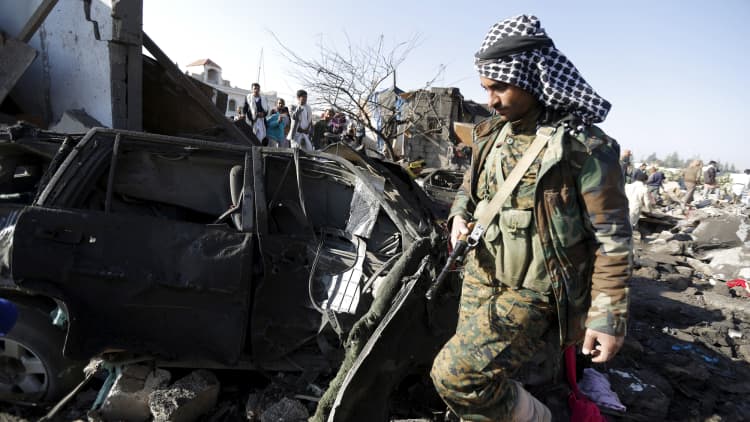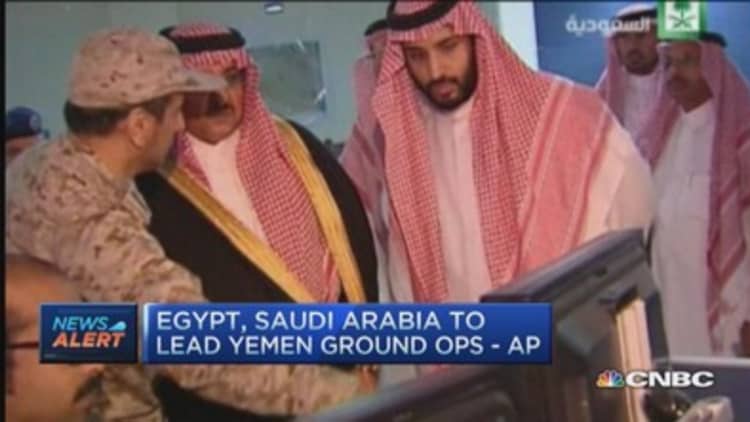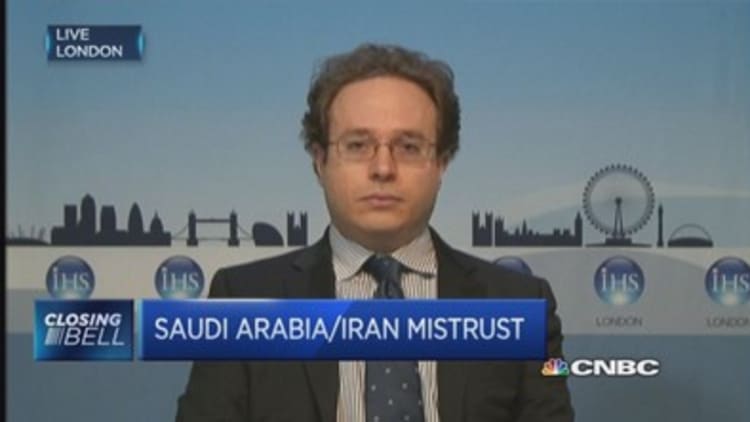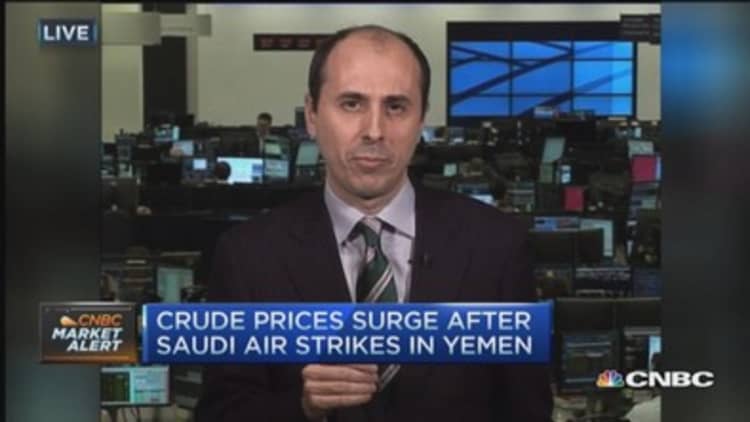


Fighting in Yemen may not disrupt energy supplies out of the Middle East just yet, but there's more to worry about than just oil.
As a Saudi-led coalition began airstrikes in Yemen on Thursday, oil markets shot higher. Sunni Saudi Arabia and Egypt are mobilizing to combat Shiite rebels who have overrun much of the country. Yemen is not a significant producer of oil, but it still had markets on edge as some worried that fighting there could trigger broader fighting in the region.
"Between Iraq, Syria, now Yemen—there are dominoes falling, and that's always the concern," John Spallanzani, chief global macro strategist at GFI Group, told CNBC.
Saudi Arabia's coalition of more than 10 states initiated what's being called "Operation Decisive Storm" to tamp down a budding civil war in Yemen and avoid the situation faced by Iraq and Syria—both nations mired in fighting that threatens their very existence.
In a statement provided to CNBC, the office of Egypt's president said: "It was imperative for Egypt to assume its responsibility and respond to the call of the Yemeni people in order to restore stability and preserve its Arab identity."
Read More What's going on in Yemen—and why are Saudis involved?
But Yemen is already a failed state, according to Kamran Bokhari, an adviser on Middle Eastern and South Asian Affairs for global intelligence and advisory firm Stratfor.
"In many ways, isn't Yemen already like Syria?" Bokhari asked. He predicted that Saudi efforts to quash a Shiite-led Houthi rebellion in Yemen will not be as successful as similar efforts the Saudis made in Bahrain in 2011 because Yemen no longer has a central government to work with.
Addressing that power vacuum is the primary strategic goal for Saudi Arabia, Bokhari told CNBC, and the airstrikes were aimed at bringing non-Houthi elements to the negotiating table.
Some have suggested that the escalation in Yemen is really a battle between Sunni Saudi Arabia and, by proxy, Shiite Iran, but Bokhari suggested that Tehran is too far away and stretched too thin to influence what's happening on the Arabian Peninsula. Saudi Arabia, in contrast, borders Yemen.
"The die is cast," Ed Walker, former assistant secretary of state and ex-ambassador to Saudi Arabia, told CNBC's "Power Lunch." "The Saudis have entered in now."
For their part, investors are watching developments in Yemen with worries that the fighting there could disrupt oil, but with even greater trepidation that it could lead to a bigger conflict.
Commodities trader Morgan Downey predicted that a war in Yemen would add $4 or $5 to the price of a barrel of oil (currently near $59). Direct Iranian involvement would push prices much higher, but that kind of escalation is unlikely.
"Yemen's not a huge exporter of oil, but it's just strategically located in terms of shipping, and it's obviously significant in that," Spallanzani said.
Yemen sits on the southern end of the Arabian Peninsula, with its most southern tip forming one side of the Bab el-Mandeb strait connecting the Red Sea and the Gulf of Aden. About 3.8 million barrels of oil per day passed through the strategic chokepoint in 2013, according to the U.S. Energy Information Administration.
At its narrowest point, the strait is only 18 miles wide, according to the EIA.
"Control of that area is important to the region and the world," Beth Grill, a Middle East analyst for the Rand Corp., told CNBC when Yemen fighting began escalating in January.
Some traders may be worried about the strait, but the United States has already committed itself to keeping the route unobstructed.
"We would work in conjunction with our GCC [Gulf Cooperation Council] partners to ensure that those straits remain open," Gen. Lloyd Austin told a Senate hearing Thursday. "It is one of our core interests to ensure that we have free flow of commerce through both straits," he added, referring to Bab el-Mandeb and the Strait of Hormuz between Iran and the Arabian Peninsula.
For its part, Saudi Arabia said it plans to beef up security at its borders and around oil and industrial instillations, state news agency SPA reported on Thursday, citing a statement by Deputy Crown Prince Mohammed bin Nayef.
Read MoreIs Yemen the new catalyst for oil?
A Jordanian official told CNBC that the country joined the coalition against Houthi forces because ensuring the security and stability of Saudi Arabia and the Gulf is a primary strategic goal. OPEC member Kuwait said earlier on Thursday that it raised security around its oil facilities inside and outside the country after the military operation in Yemen.

The United States has committed logistical and intelligence support to the operations in Yemen, but the situation may ultimately require more than that, according to Anthony Cordesman, the Arleigh A. Burke Chair in Strategy at the Center for Strategic and International Studies.
"Yemen is of major strategic importance to the United States, as is the broader stability of Saudi Arabia (and) all of the Arab Gulf states," he wrote in a note Thursday. "For all of the talk of U.S. energy 'independence,' the reality remains very different. The increase in petroleum and alternative fuels outside the Gulf has not changed its vital strategic importance to the global and U.S. economy."
Read MoreTurmoil in Yemen could have global implications
There's still hope that the situation in Yemen can be resolved diplomatically, but Cordesman warned that the U.S. needs to be prepared to face the reality of another drawn-out hot zone in the region.
Americans "need to understand just how important a threat Yemen can be, just how deep the underlying forces that divide its current factions really are, that terrorism and extremism remains a far greater problem than ISIS, and that Iran's ambitions to steadily broaden its strategic role throughout the region pose as much of a threat as its nuclear ambitions," he said.
—Reuters and the Associated Press contributed to this report.


